Introduction
The internet is home to billions of websites. There are a number of websites similar to yours. And search engines are the foremost way to market your website to the global users. Each and every competitor is thriving to get their website on top. You want to “leave behind” all those websites to win the race of SERP. Isn’t it? How would you do that? “Through SEO” definitely would be your reply. Yes, SEO is the “key to scoring good results” in the search engine rankings.
SEO is a very competitive field. It requires a lot of creativity, hard work, patience, and research and analytics skills to achieve success in SEO campaigns. And all these efforts have a high potential to go in vain because of your choice of keywords.
Finding keyword for your online business is an art. Imagine how the words selection proficiency allows you to dominate over your listeners. Similarly, the appropriate keywords in your web content not only help you get good SERPs, and desired target traffic – but also you would have the luxury to know your customers better than your competitors.
“Are you struggling to expert the art of researching keywords?”
There are some good tips on the internet available here and here. What made me write this post when there is almost a lot of articles shared on the web by many reputed and experienced search engine optimizers. Well, this is just a way to share my own experiences. Apart from that, it allows me to help my clients and everyone who wants to learn search engine optimization. Let me share the step by step process of keyword research to help all beginner SEOs.
What are the keywords?
In simple words, keywords are the reflection of the user search criteria. According to Brad Geddes, “keywords are the thoughts put into actions”.
In words of SEO, they’re the terms and words that searchers “use to find answers for their questions” on search engines. These are also called “search queries”.
For “a searcher”, a keyword is “a question”. For “search engines and website” the keyword is “the answer to the user’s question”. The success of your SEO campaign totally depends on the selection of your keywords. Your keywords allow the search bots to “identify the usability of your webpage” to meet its end user’s query.

What is a keyword?
While researching keywords for your webpage, you must always “keep the end user in mind”. After all its there question your webpage is going to “answer and solve”. Be it any product they are looking to buy or any news, and information about a certain topic. Make sure you provide up to date and relevant information on your webpage.
Understanding the user intent
Today’s user is much smarter and adroit.

Understanding the User Intention
There is more demand for “knowledge and information” than ever before. While offering your services to the online audience you need to understand their need.
To start researching the best suitable keywords; you must first understand the user intention.
The search queries are bound to fulfill the following intentions of the user
- Collect Information: A search is done to collect information about a specific area, product or services. For example Best books of 2018, Best restaurants near me
- Do a task: A search query that indicates the user’s intention to perform a specific task like buy a product or watch a movie or listen to songs online.
- Learn a process: A search is done with the aim to solve a user specific problem. For example: How to download Windows 10? What to do when a computer restarts automatically?
- Navigation: When a user wants to navigate to an online address like. Live cricket star sports, Twitter etc.
When we create website content, we generally, put all our knowledge in the best possible ways we can. But does that fulfill our goal of attracting the target audience?
To get target visitors to your website it is essential to embed your content with the right keywords. And when you have content that matches best for the user queries you score high rankings on Google. However, there are various other factors that sum up for the top ranking worthiness of your website. Before initiating your keyword research first understand the purpose of your research. The ultimate goal of keyword research is to find the best keywords that your target users are using to search.
Where and how to search the keywords that map the user mind?

Understanding the user intent
There are many tools available online for this purpose. But before heading to any tool you must first be prepared with your niche topic.
Prepare a list of Why what, how your web services going to benefit your customers.
Expand your list with the relevant searches and questions a user asks on search engines. Refer the screenshots and look at the “People also ask” and “Searches related to the query” section.

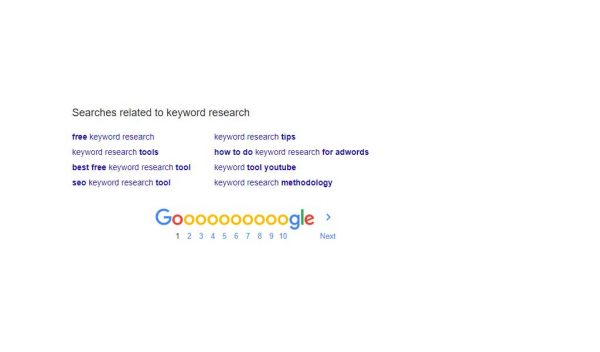
Head to all the major search engines and repeat the same task to expand your list.
Your niche topic list is ready now.
It’s time to research some keywords.
To begin collecting keywords, let us follow the traditional approach. We will group keywords among the three sections.
Head Keywords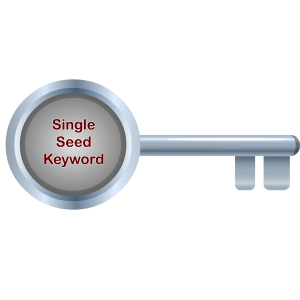 |
Body Keywords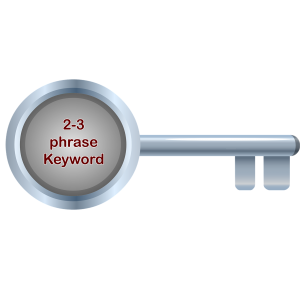 |
Long Tail Keywords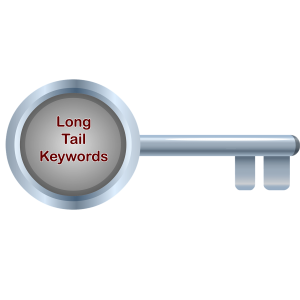 |
| These are solo words and have high search volume and very high competition. For example, “gifts” or “computer”).
These are generally low conversion keywords. |
These keywords include 2-3 words long and have good search volume (at least 2,000 searches per month). Body keywords are more specific in nature. For example “gifts for girls” or “computer keyboards”. These are competitive keywords. With lower competition than the Head keywords. | These keywords are a group of more than 3 words. These are very specific in nature. For example “affordable gifts for four-year-old girls” and “best computer keyboards deals online” are examples of long tail keywords. |
Did you know? The term long tail was first popularized by “Chris Anderson in 2004”.
Since head keywords are the most competitive keywords. It is very difficult and time-consuming to rank with these keywords.
I generally escape head keywords and begin with collecting body and long tail keywords. The reason is pretty obvious, they are highly competitive and low converting.
Let us explore some of the best available online tools at this stage.
The best tools for keyword research in 2019 are:
It is a free tool by the most popular and leading digital marketing gurus Neil Patel.
The tool is an awesome aid for SEO. The main features of UberSuggest are keyword overview, Keyword Ideas, and SERP analysis.
The tool demonstrates the keyword search volume graph. It becomes easier to identify popular keywords.
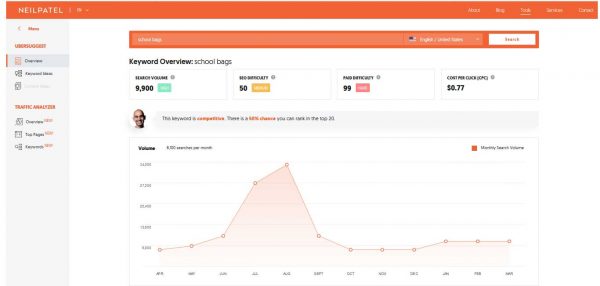
It also shows cost per click, the SEO difficulty, and the paid difficulty for the suggested keywords.
The keyword ideas are generated using Google Suggest and AdWords data.
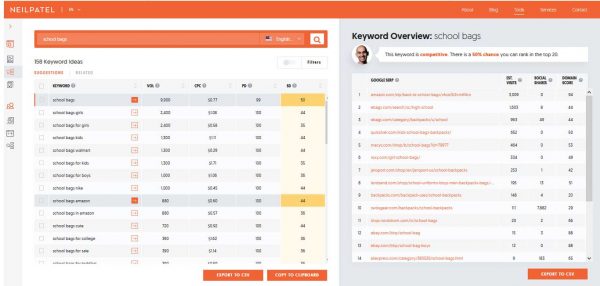
It also gives you an idea of the top 100 websites in the SERP.
Star feature: The keyword ideas report generated by the tools is all set with the estimated visits and difficulty for the desired term. It helps you identify how strong your competition is by showcasing directly the number of social shares and the domain authority of your competitor.
Along with the above features, the tool also shows rich snippets or paid listings associated with the keyword. You can also filter the keywords on the filters based on popular and competitive, long tail terms etc.
There is an option to download the CSV file.
An easy to use a powerful keyword tool.
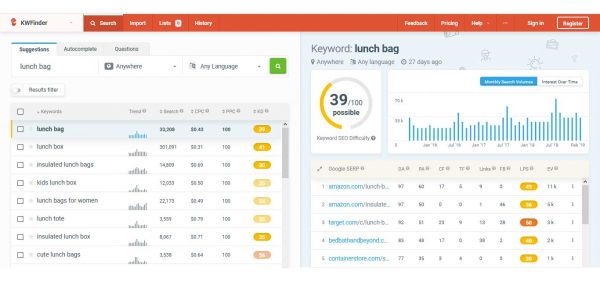
KWFinder is another great research tool with a lot of features that include –
- Find long tail hidden keywords
- Organize keywords with a keyword list
- Filter unprofitable keyword
- Local keywords
- Keywords Import
- Keyword Difficulty
- Google suggested keywords
- Search trends and keyword metrics
- SERP analysis and SEO metrics
Star Feature: Keyword Difficulty
KWfinder presents you with all the needed features an SEO tool must have. While all its features are useful and trendy. My favorite star feature is the keyword difficulty.
The automatic presentation of keyword difficulty lets you identify how hard it would be to rank with the words.
It is another great too free and simple to use. You just need to download the free extension and activate it.
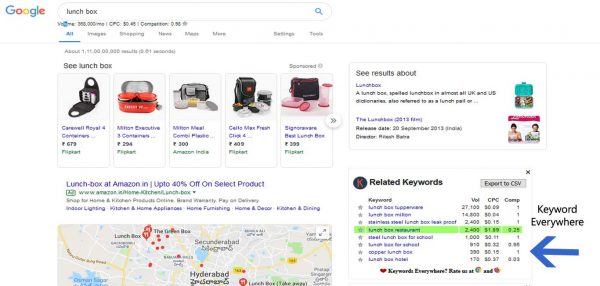
Star feature: Ability to show a list of related keywords with search volume, CPC and competition.
This is one of the best tools available for keyword research. Soovle suggests keyword ideas from various sources like Google, YouTube, Bing, Amazon and more.

A wonderful tool and a treat for SEO to collect all the keyword ideas from one place. Bingo!
Yes, it can be the one-stop solution for keyword research. It saves you time spent on the research process. And lets you discover intact keywords.
Star Feature: Allows you to save the selected keywords with drag and drop.
You can also download the CSV file of the selected keywords.
Though it’s not the most enhanced keyword research tool available online, it’s a great and awesome one for the beginners.

Answerthepublic is remarkably useful for local businesses, and for content development. It’s vivacious and free to generate keyword and content ideas that are actually in trend.
Conclusion
Keyword research is the most crucial element of the SEO process. It requires a good understanding and knowledge of the technical expertise to extract the best profitable terms for a website.
Generally, a research process is a complex, time-consuming and costly task.
But with the help of tools mentioned above, you can cut down the cost and time while uncovering a list of profitable keywords.
Before initiating your research process, here is a precautionary suggestion.
Using tools to research terms may result in building a lengthy list of useful targeted keywords.
But it’s also essential to prioritize how many keywords should actually be mounted into your web pages?
Remember, the ultimate goals of keywords research should be to
- include them inherently in the web content
- help search engines deliver the best relevant results to the users.
To get the best results from your researched work and SEO focus on
- Incorporating the target keywords naturally in your content.
- Avoid stuffing the content with keywords.
- Create helpful content to allow the phenomenal need for keywords.
- Use long-tail keywords and avoid using the primary keywords separately.
- Use synonym or relevant contextual keywords in your content.
Let us now begin your SEO journey with keyword research using the tools mentioned above. These tools would definitely help to find the relevant keywords. And you can achieve the desired digital marketing results for your website.
What are your SEO tips and recommended keyword research tool?
Recommended for you
Re-imagining businesses through experiences
We are a full-service digital agency with leading capabilities across digital – from web design to development, branding to marketing, cloud transformation to security. We create human-centered and future proof experiences – enabling transformation, ensuring sustainable growth.


